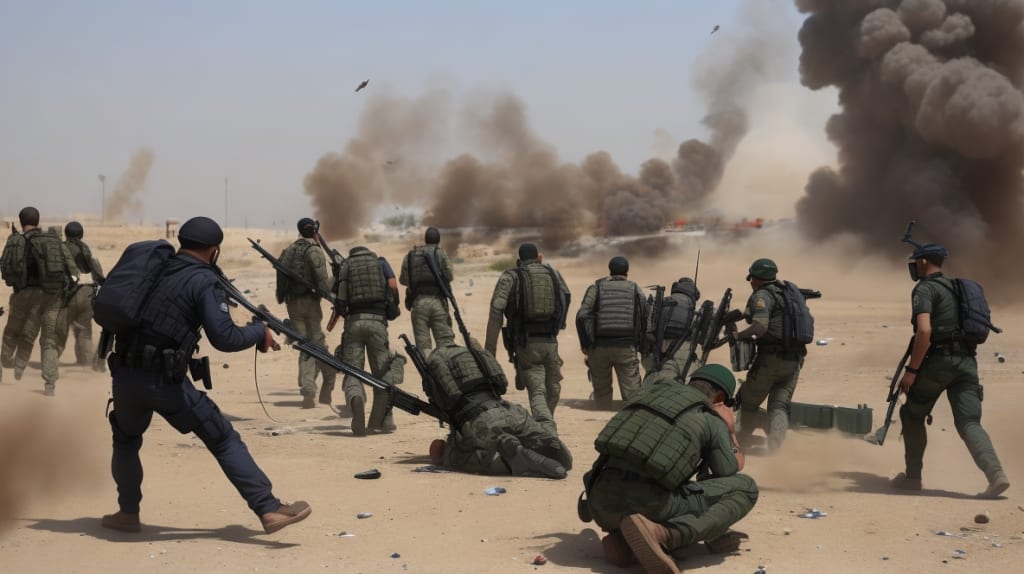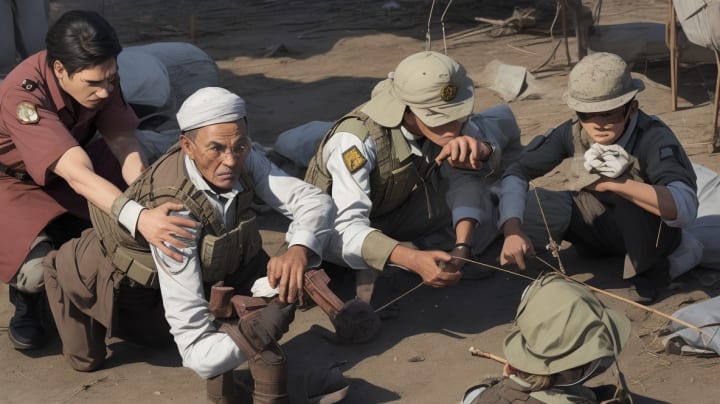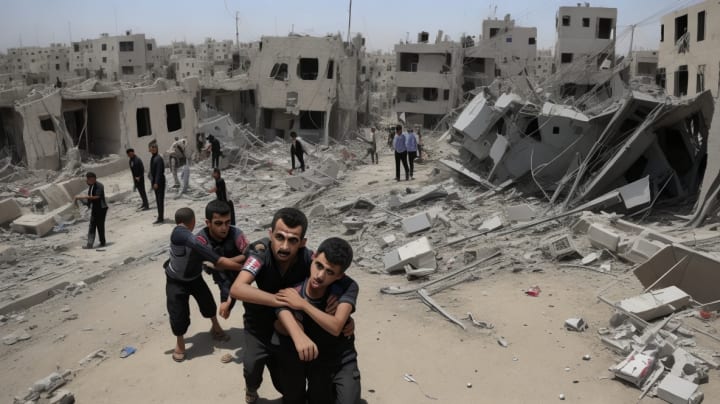Tragedy Strikes in Gaza
Conflicting Accounts Surround Hospital Airstrike

A devastating incident unfolded in Gaza City on Tuesday, as a hospital compound was hit by an airstrike, resulting in a reported 500 casualties according to the Gaza Health Ministry. Israeli officials, however, dispute the claim, asserting that the explosion may have been caused by a rocket misfire from Hamas or Islamic Jihad.
This tragic event coincided with President Biden's imminent visit to Israel, where he aimed to express solidarity with the nation, which has been grappling with a wave of terror attacks perpetrated by Hamas in southern Israel. Originally, the president had plans to meet with leaders from Jordan, Egypt, and the Palestinian Authority during a stop in Jordan, but this meeting was canceled in light of the hospital tragedy.
Prior to his departure, Secretary of State Antony Blinken revealed that the U.S. and Israel had reached an agreement to devise a plan facilitating the delivery of humanitarian aid to civilians in Gaza. This densely populated Palestinian territory, controlled by Hamas for nearly two decades, has been under relentless Israeli airstrikes and a comprehensive blockade since Hamas' October 7 attack. These measures have displaced approximately half of Gaza's 2.3 million inhabitants, leading to a dire humanitarian crisis with shortages of essential resources such as food, fuel, and water.
Official figures from Palestinian sources suggest that Israel's bombardment of Gaza has resulted in the loss of around 3,000 lives, with about 12,500 individuals sustaining injuries, a significant portion of whom are women and children. Meanwhile, Israeli authorities report that Hamas' acts of terror, along with persistent rocket attacks, have claimed the lives of roughly 1,400 individuals and left 3,500 others wounded. Tragically, it is reported that Hamas is currently holding nearly 200 hostages.
In the aftermath of the Hamas raids in Israel, 13 U.S. citizens remain unaccounted for, while 30 have been confirmed as casualties. An estimated 600 U.S. nationals are believed to be among the hundreds of thousands of people trapped in Gaza, highlighting the urgency of addressing the dire situation and providing humanitarian assistance. The complex and heartbreaking circumstances in the region underscore the pressing need for diplomatic efforts and international cooperation to bring about stability and relief to those affected by this devastating conflict.

International Humanitarian Law (IHL), also recognized as the laws of war, encompasses a comprehensive framework designed to regulate armed conflicts. This body of law is comprised of several pivotal components, including the four Geneva Conventions of 1949, the two Additional Protocols established in 1977, the Hague Conventions of 1899 and 1907, and various conventions pertaining to weaponry.
In essence, the primary objective of these legal instruments is to shield non-combatants and individuals who have ceased active participation in hostilities from the adverse impacts of war. This is achieved through the imposition of a set of constraints and prohibitions governing the conduct of warfare.
It is essential to clarify that modern IHL does not concern itself with the rationale behind initiating a conflict, nor does it address the legality of engaging in warfare. These aspects fall under the purview of the United Nations Charter and the respective practices of member states.
Moreover, it is imperative to acknowledge that prosecuting violations of the laws of war is a notably intricate endeavor. Challenges often arise due to a lack of cooperation from the involved parties, adding a layer of complexity to the legal proceedings.
In summary, International Humanitarian Law stands as a critical framework that endeavors to mitigate the impact of armed conflicts on civilians and non-active combatants. Encompassing various conventions and protocols, IHL sets forth guidelines and prohibitions that govern the conduct of warfare. While it does not adjudicate the reasons behind or the legality of going to war, its significance in safeguarding human rights during times of conflict cannot be overstated. Despite the inherent difficulties in enforcing these laws, their presence remains indispensable in upholding the principles of humanity in the face of armed hostilities.

Following a significant terror attack launched by Hamas from the Gaza Strip on October 7, which led to a series of retaliatory airstrikes and a declaration of war by Israeli Prime Minister Benjamin Netanyahu, questions arise as to the motives behind this shocking escalation. Understanding why Hamas chose this particular moment for such an aggressive move requires an exploration of several underlying factors.
Even prior to its ascent to power in Gaza in 2007, Hamas had openly advocated for the "obliteration" of Israel as a central tenet of its policy. The Gaza Strip, a confined territory approximately twice the size of Washington D.C., has been subjected to strict blockades since 2005, enforced by both Israel and Egypt out of concerns for security. Despite these measures, the region has remained permeable due to a network of smuggling tunnels, earning it the reputation of being one of the world's largest open-air prisons, with a population of 2.3 million people residing in extremely close quarters.
Hamas asserts that its decision to launch the attack stems from deep-seated grievances over Israeli policies. This includes recent flare-ups of violence at the Al-Aqsa Mosque in Jerusalem and, more broadly, concerns regarding the treatment of Palestinians and the expansion of Israeli settlements. The group frames these actions as a culmination of longstanding frustrations.
However, it is crucial to highlight that Israel and the U.S. reject any notion of "moral equivalence" between Hamas' attacks, which have resulted in the loss of innocent lives, and Israel's defensive measures in response to perceived acts of terrorism. U.N. Secretary-General Antonio Guterres, while acknowledging the legitimate grievances of the Palestinian people, unequivocally condemned acts of terror and the harm inflicted on civilians.
Unraveling the complete rationale behind the scale and timing of this recent attack is an intricate task, given the complex nature of Middle Eastern geopolitics. Nonetheless, it is apparent that a combination of historical grievances, recent events, and broader regional dynamics likely influenced Hamas' decision to escalate tensions, even in the face of potential repercussions from Israel.
So, How this war end? Why or When?
Hope this war will never happened again.
About the Creator
Rey Writer
Just a create a new story






Comments
There are no comments for this story
Be the first to respond and start the conversation.